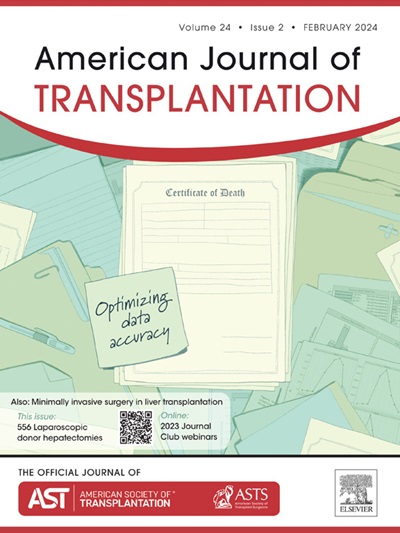Multiplex bead immunoassay in ABO-A2-incompatible kidney transplantation
IF 8.2
2区 医学
Q1 SURGERY
引用次数: 0
Abstract
Kidney transplantation from ABO-A2 donors into ABO-O and ABO-B recipients can alleviate inequitable transplant access created by ABO demographics. ABO-A2-incompatible (ABO-A2i) eligibility is determined by anti-A hemagglutination titers. However, titers do not distinguish antibodies specific for A-II glycans, the sole A-antigen subtype in vascular endothelium, from other anti-A antibodies. We examined whether reliance on anti-A titers unnecessarily limited ABO-A2i transplants for candidates with low anti-A-II levels. We created a single-antigen bead immunoassay for ABO antibodies, confirmed the specificity and reproducibility, and demonstrated the ability to detect anti-A and anti-B glycan subtype-specific antibodies in healthy control sera. We then measured subtype-specific anti-A antibodies in original sera from ABO-B and ABO-O candidates who had been previously evaluated for ABO-A2i eligibility. Anti-A-II levels in candidates who had been deemed ineligible (anti-A titers >4) were compared to eligible candidates (anti-A titers ≤4) who had subsequently received ABO-A2i kidneys. Of 141 candidates, 75 (53%) were ineligible; 66 (47%) were eligible and received ABO-A2 kidneys. Retesting original sera, 55% (41/75) of ineligible candidates had anti-A-II levels comparable to eligible candidates. Anti-A titers did not reflect anti-A-II levels. Our ABO antibody assay reproducibly measures graft-specific anti-A-II antibodies, providing information beyond anti-A titers that may increase transplant access for ABO-B and ABO-O candidates.
abo - a2不相容肾移植的多重头免疫分析。
将ABO- a2供者的肾脏移植到ABO- o和ABO -B受体可以缓解ABO人口统计造成的移植机会不公平。abo - a2不相容的资格由抗a血凝滴度确定。然而,滴度不能区分A-II聚糖(血管内皮中唯一的a抗原亚型)特异性抗体与其他抗a抗体。我们研究了对抗a - ii水平低的候选人依赖抗a滴度是否不必要地限制了abo - a2不相容移植。我们创建了ABO抗体的单抗原头免疫测定,证实了特异性和可重复性,并证明了在健康对照血清中检测抗a和-B聚糖亚型特异性抗体的能力。然后,我们测量了ABO-B和-O候选人的原始血清中亚型特异性抗a抗体,这些候选人先前已被评估为abo - a2不相容的资格。将被认为不合格的候选人(抗a滴度bbbb4)的抗a - ii水平与随后接受abo - a2不相容肾脏的合格候选人(抗a滴度≤4)进行比较。141名候选人中,75名(53%)不符合条件;66例(47%)符合条件并接受了ABO-A2肾脏。重新检测原始血清,55%(41/75)不合格候选人的抗a - ii水平与合格候选人相当。抗- a滴度不反映抗- a - ii水平。我们的ABO抗体测定可重复测量移植物特异性抗a - ii抗体,提供抗a滴度以外的信息,可能增加ABO- b和-O候选人的移植机会。
本文章由计算机程序翻译,如有差异,请以英文原文为准。
求助全文
约1分钟内获得全文
求助全文
来源期刊
CiteScore
18.70
自引率
4.50%
发文量
346
审稿时长
26 days
期刊介绍:
The American Journal of Transplantation is a leading journal in the field of transplantation. It serves as a forum for debate and reassessment, an agent of change, and a major platform for promoting understanding, improving results, and advancing science. Published monthly, it provides an essential resource for researchers and clinicians worldwide.
The journal publishes original articles, case reports, invited reviews, letters to the editor, critical reviews, news features, consensus documents, and guidelines over 12 issues a year. It covers all major subject areas in transplantation, including thoracic (heart, lung), abdominal (kidney, liver, pancreas, islets), tissue and stem cell transplantation, organ and tissue donation and preservation, tissue injury, repair, inflammation, and aging, histocompatibility, drugs and pharmacology, graft survival, and prevention of graft dysfunction and failure. It also explores ethical and social issues in the field.

 求助内容:
求助内容: 应助结果提醒方式:
应助结果提醒方式:


